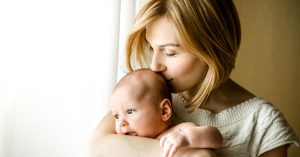
RHRLI Has a Permanent Solution for Hair Loss
RHRLI also wants you to know about our permanent solution to hair loss. It’s called the ARTAS® System and it employs robotic technology to give you a virtually pain free hair transplant. There’s no surgical incisions with ARTAS® and the result is a fast recovery time and a healthy head of hair. We’ll sit down and consult with you about your case. We know information is valuable which is why we’re sharing what we know about hair loss after pregnancy.
The Basics of Hair Loss and Child Birth
According to the American Hair Loss Association, (AHLA) the condition most associated with hair loss and traumatic events like child birth is called Telogen Effluvium. Stressful events like giving birth, having major surgery, a severe infection or malnutrition can cause your hair growth cycle to shift from the growth phase (anagen) to the shedding phase (telogen) of the cycle.
Hormonal shifts that occur during and after pregnancy can also trigger hair loss, according to some doctors. “During pregnancy there are lots of hormonal shifts happening and one thing that those hormonal shifts do is promote hair growth,” Dermatologist Dr. Sejal Shah told the website Fit Pregnancy.
“She has a lot of extra hormones in the body, including estrogen,” Dr. Christine Carlan Greves, a Florida based OB-GYN told Allure. “The estrogen helps protect us from losing our hair. Then when she has the baby, there’s a sudden change in the hormone levels, including a drop in the estrogen. And this shift can cause a response in the body that may affect the hair cycle.” Graves says that breastfeeding can also contribute to hair loss because it increases the level of a hormone that is associated with hair loss.
Treatment for Telogen Effluvium
In many cases, telogen effluvium is short term and can go away when the stress goes away. According to americanpregnancy.org, it’s usually not permanent and tends to diminish within 3-4 months after delivery. One 2016 study went so far as to argue that Postpartum Telogen Effluvium is rare and may not even exist. If hair loss doesn’t grow back consult with a doctor, avoid hairstyles that can pull on your hair and eat a diet that’s high in fruits and vegetables.
RHRLI and ARTAS® Can Change Your Life
If your hair loss is permanent come to RHRLI and we’ll explain every step of the ARTAS® procedure. Unlike strip surgery, you won’t need an incision and stitches and our robotic precision will give you a healthy new head of hair. ARTAS® is life changing. To learn more, contact RHRLI today.

Leave a Reply
You must be logged in to post a comment.